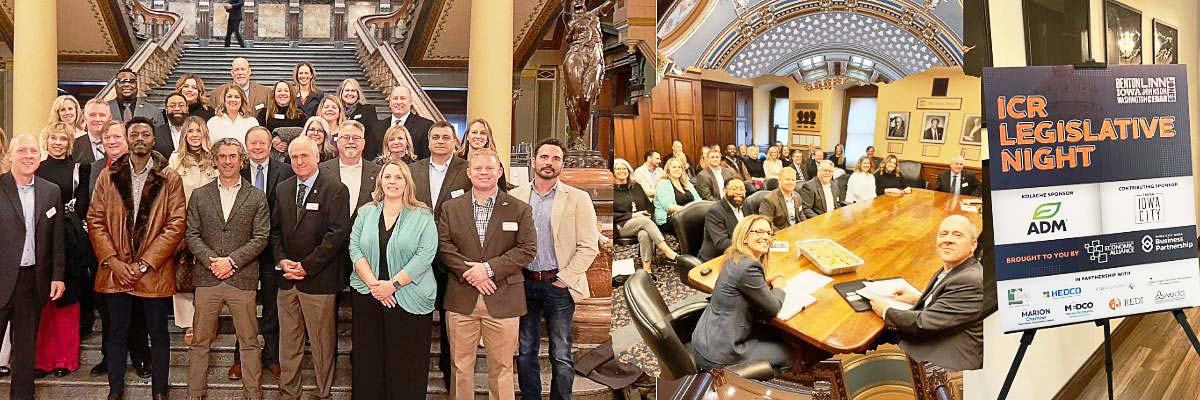
Public Policy Update: ICR Legislative Night a Success
March 23, 2023 | Public Policy
State Policy Update
The 2023 session’s first funnel deadline was last Friday. Following this deadline, hundreds of bills did not survive, making them ineligible to advance, with certain exceptions. Debate will continue in the weeks ahead, followed by the second funnel deadline on March 31st and the scheduled end of session on April 28. An update on the bills the Economic Alliance is closely monitoring this session include:
Higher Education & Workforce:
- HSB218/HF616 would ban public Iowa universities from spending state or private funds on diversity, equity, and inclusion (DEI) programs and trainings, including the hiring of professionals to serve as DEI officers. We are registered opposed to this bill, as it would act as another inhibitor for our region to attract and retain talent, as well as subject Universities from receiving certain federal research contracts, interfere with accreditation programs and training that mitigates legal risks. Status: Passed House Education Committee on 3/3 and awaits action by the full House.
Child care:
- HF343 creates a two-year pilot program to make child care workers automatically eligible for state child care assistance (CCA) for their own children. Status: Awaits floor debate and vote in the House.
- HF47 exempts from the induvial income tax the amount of wages received by a taxpayer for providing certain child care services. Status: Not subject to funnel deadline. Passed out of House Ways & Means Subcommittee on 1/25.
Government Reorganization:
- SF514 is Governor Reynolds’ proposal to realign state government including reducing the number of state agency directors who report directly to the Iowa governor from 37 to 16 and streamlines the executive branch of state government by consolidating existing agencies and programs. Status: Passed full Senate on 3/7. Awaits House action.
Taxes:
- SF356 sets limitations on cities and counties’ annual growth budgets from property tax funds. The bill governs a county’s authority to enter into loan agreements, leases, and lease-purchase contracts, and lowers thresholds that would trigger the requirement of approval by election, and also cap tax levy rates. Status: Not subject to funnel deadline. Passed out of Senate Ways & Means Committee on 2/21.
- SF550 adjusts property tax credits by lowering threshold requirements for the elderly and military service members as well as phasing out the homestead tax credit while creating a homestead tax exemption. Changes to how water service is taxed is also included, putting all of the funds received into the general fund and not a water quality financial assistance fund. A sales tax increase of 6% to 7% has been proposed that would help fund the constitutionally created Natural Resources and Outdoor Recreation Trust Fund. The bill would also create certain property tax assessment limitations by reducing the percentage of actual value that is assessed of commercial, industrial and railway properties that exceed $150,000. Status: Not subject to funnel deadline. Passed out of Senate Ways & Means Committee on 3/9.
SSB1126 further reduces the individual and corporate income tax rates and the insurance premium tax rates. Status: Not subject to funnel deadline. Passed out of Senate Ways & Means Committee on 3/1.
Economic Development & Placemaking:
- HF642 creates legislation that creates the “Major Economic Growth Attraction Program” or “MEGA Program” so Iowa can better compete for large scale economic development projects that provide high paying jobs and capital investment. Status: Passed out of House Economic Growth & Technology Committee on 3/7.
- SF408/HF641 is an Iowa Economic Development Authority (IEDA) bill that includes the Angel Investor Tax Credit program that encourages entrepreneurship and economic growth. Status: Not subject to funnel deadline. Awaits action in Senate and House Ways & Means Committees.
- HF526 creates an “Authority” that would allow specific advantages for regional economic development and placemaking projects. Status: Passed out of Senate Commerce Committee on 3/6.
Housing:
- HF506 funds the workforce housing tax program to help incentives developing more housing options in both rural and urban areas. Status: Not subject to funnel deadline. Awaits action in House Ways & Means Committee.
Apprenticeships:
- SF318/HF639 establishes the Iowa Office of Apprenticeship within Iowa Workforce Development, leveraging existing staff to oversee program development, compliance, business engagement, and grant management to help address future workforce development. Creates a state-level advisory board which will include members from multiple industry sectors to ensure program performance and sustainability. Status: Passed out of Senate Workforce Committee on 2/16. Passed out of House Economic Growth & Technology Committee on 3/6.
Immigration:
- SF108/HF105 requires employers to use the federal Employment Verification (E-Verify) system in hiring practices to verify a person’s citizenship status. We do not support the mandatory use of E-Verify because the system is flawed and would penalize employers regardless. Status: Passed out of Senate Judiciary Committee on 1/26. Passed out of House Judiciary Subcommittee on 2/8.
New Resident/Graduate Incentives
- HSB63 creates a new resident and new graduate tax credits, which are available against the individual income tax. Status: Not subject to funnel deadline. Passed out of House Ways & Means Subcommittee on 1/31.
- HF447 establishes the Iowa workforce grant and incentive program within the college study aid commission and modifies the responsibilities of the Iowa Workforce Development board. Status: Not subject to funnel deadline. Awaits action in House Appropriations Committee.
Mental Health Workforce
- SF127/HF494 allows Iowa to adopt the Professional Counselors Interstate Licensure Compact, a system whereby professional counselors licensed to practice in one member state may practice in another member state. Status: Passed Senate Health & Human Services Committee 1/25. Awaits action in House Ways & Means Committee.
Second Chance Hiring
- HF15 establishes a pathway to education and employment reentry program to be administered by community colleges to ensure formerly incarcerated citizens can successfully transition back into the community. Status: Died in the first funnel.
The Revenue Estimating Conference (REC), a non-partisan committee whose purpose is to periodically make state revenue estimates, met this morning to provide the legislature with the most recent Fiscal Year 2024 estimate. The legislature will begin to develop the FY24 budget following the REC meeting, and floor debate work will pick up in both chambers to consider bills that survived the first funnel.

ICR Legislative Night
For over 20 years, the Iowa City Area Business Partnership & Cedar Rapids Metro Economic Alliance have joined forces with our regional partners for our annual advocacy trip to the Capitol to discuss pro-growth issues with policy leaders. This year also included an evening reception for all legislators across the state. Prior to the reception, a group of Economic Alliance and Business Partnership members, including regional partners, business & industry, non-profits and city officials, gathered at the Capitol for a meeting with the Governor. We discussed items from our 2023 regional public policy agenda including child care, community attraction funding, property tax reform, housing, apprenticeships and economic development incentives.
Federal Policy Update
Advocating for International Investment
Barbra Solberg, Economic Alliance’s public policy strategist, and member of the Iowa Advisory Council for the US Global Leadership Coalition (USGLC), met with U.S. Representative Ashley Hinson (IA02) earlier this week. Joined by other USGLC advisory board members including Cedar Rapids Mayor O’Donnell, the group discuss global issues like trade and international investment, cyber security and hunger, and their impact on the Cedar Rapids region. The group encouraged Rep. Hinson to support fully funding the International Affairs Budget and continue U.S. investments in international development and diplomacy for the health, security, and economic interests of all Americans. The Cedar Rapids region only benefits from strong trade agreements and opening new markets in stable and free countries across the globe. Pictured: Members of USGLC’s Iowa Advisory Council, including Solberg and Mayor O’Donnell meet with U.S. Rep. Ashley Hinson.
Addressing the Pilot Shortage
The nation’s pilot shortage has been ongoing for nearly a decade and is currently at an all-time low. Nearly 76% of the countries’ commercial airports have less air service than before the COVID-19 pandemic. Our policy agenda has long called for addressing the nation’s pilot shortage to pushing for sustainable and competitive regional air service. Recently we joined with the Eastern Iowa Airport (CID), our regional partners at the Iowa City Area Business Partnership and other members of the Rally for Service Air Coalition to send a letter to the Chair and Ranking Members of the House Committee on Transportation House Committee on Transportation and Senate Committee on Commerce, Science, and Transportation. In the letter, the Coalition members urge lawmakers to work together to develop a safety-first solution that provides greater pilot career access and creates more high-quality pilots that our regional airports rely on to support our communities.